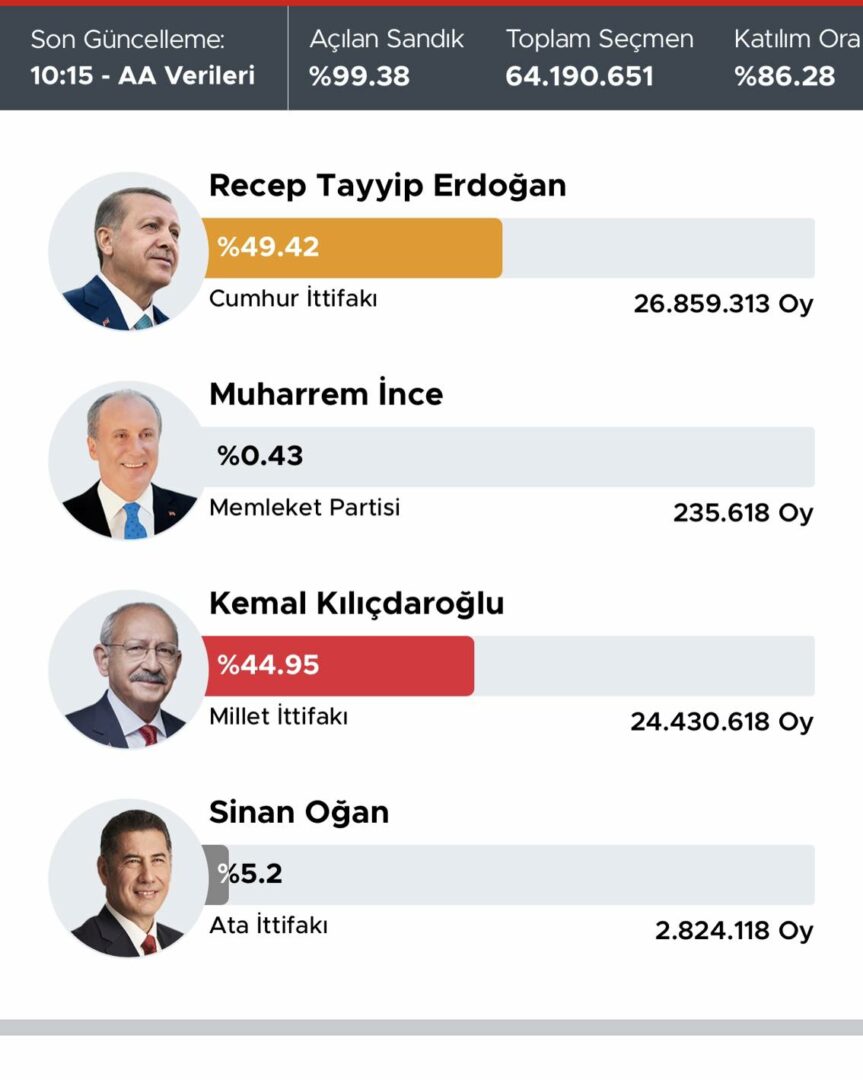Victor Ponta’s analysis of the Turkish presidential election: „Erdogan contradicts all polls”. What are the lessons for Romania?
:format(webp):quality(80)/https://romaniatv.net/wp-content/uploads/2022/12/ponta_termocentrale.webp)
:format(webp):quality(80)/https://romaniatv.net/wp-content/uploads/2022/12/ponta_termocentrale.webp)
Recep Erdogan, the president of Turkey, who has been in power for 20 years, could reach the second round, together with Kemal Kilicdaroglu, the representative of the opposition, the one considered closer to the US, respectively the West.
After counting 98% of the votes, Recep Erdogan registers 49.34% of the votes, and Kemal Kilicdaroglu 45%.
„Why the elections in Turkey are important for Romania and for Romanians: NATO – the greatest partner on the Black Sea + the largest commercial partner outside the EU + the largest business community (including Romanian businessmen of Turkish origin) + the main tourist destination (along with Greece) for Romanian citizens and the main means of international transport in Istanbul Airport + despite the international „Propaganda” Turkey proved once again that it has democratic elections with a presence (almost 90%) and involvement unmatched in Europe + at these Elections, the ideological battle between „conservatives – sovereignists” and „progressives – internationalists” has significance in the entire democratic world + the political position of Turkey (which supports Ukraine politically and militarily but, which has kept economic relations with Russia – just like the other BRICS countries) arouses critics and polemics in the Western camp.
My analysis after the first round (the second round of the Presidential Elections will probably be on May 28)
1.Erdogan contradicts (again) all the polls and he’s placed first, even if he doesn’t win in the first round. Erdogan received more than 50% of the votes cast, but he lacks 0.6% of the total number of registered voters. The net difference is approximately 2.4 million votes compared to the second ranked, K Kiricdaroglu. The furious fight of the „progressives” in the international media (including Romania) and the presentation of polls that gave the Opposition candidate a 10% advantage over Erdogan proved to be „wishful thinking” or simple Propaganda (as in the case of the Hungarian Elections ). Turkish voters have a specific patriotic pride (unlike many Romanian voters) – anything that is perceived as „intervention from outside” has the opposite effect on the vote.
2. The parliamentary coalition led by President Erdogan won a categorical and unexpected victory: 321 mandates compared to 213 mandates of the Opposition Coalition led by Kilicdaroglu. It is now obvious that the constitutional change promised by the Opposition (a fundamental element in the electoral campaign) cannot be done – Turkey remains with the current system. It is quite clear that no one sees with good eyes a situation in which an already voted parliamentary majority will „fight” non-stop with a President of the Opposition. The idea of having stability and collaboration between the President and the Parliamentary majority makes political sense for moderate voters.
3. It is clear that those who voted with RT Erdogan (already in all the elections of the last 20 years) are stable supporters and will vote in the second round. But it remains to be seen if K Kilicdaroglu will manage to keep intact the alliance of six parties behind him, given that he failed to confirm the expectations in the first round (he obtained 10% less than in the polls). Considering the result of the first round and the victory in the Parliament, Erdogan gave a clear signal of victory – which can demobilize a heterogeneous Opposition coalition, united only by the goal of overthrowing Erdogan from power. Kurdish voters (they voted with their own party and with K Kilicdaroglu in the first round) no longer have the same motivation to come just to vote for the president (somewhat similar to UDMR voters in Romania)
4. The votes given to Sinan Ogan (almost 6% – 2.8 million) are votes of a nationalist electorate, which sees itself more in the position of defending national values than in Kilicdaroglu’s positions of ceding sovereignty in favor of European integration. The Azeri origin of the candidate is also an advantage for Erdogan – who has constantly supported Azerbaijan, politically and militarily
5. Although he is much better known in politics for over 20 years, Erdogan (69 years old) is 6 years younger than Kilicdaroglu (75 years old) – which limits the vote „for young people – for change”
Lessons for Romania:
1. Attendance and involvement in voting – almost 90% compared to apathy in Romania (just over 30% in 2020)
2. Much more efficient and transparent organization of the vote counting system 3. Adverse reaction to „external propaganda” „, wrote Victor Ponta on his Facebook page.
